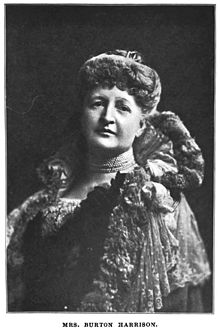Constance Cary Harrison | |
|---|---|
 | |
| Born | Constance Fairfax Cary April 25, 1843 Lexington, Kentucky, U.S.[1] |
| Died | November 21, 1920 (aged 77) Washington, D.C., U.S. |
| Resting place | Ivy Hill Cemetery, Alexandria, Virginia |
| Pen name | Refugitta |
| Occupation | Author |
| Language | English |
| Nationality | American |
| Citizenship | USA |
| Genre | Plays, novels |
| Spouse | (his death) |
| Children | 3 |

Constance Cary Harrison (pen name, Refugitta; April 25, 1843 – November 21, 1920), also referred to as Mrs. Burton Harrison, was an American playwright and novelist. She and two of her cousins were known as the "Cary Invincibles"; the three sewed the first examples of the Confederate Battle Flag.
Harrison belonged to an old Virginia family related to the Fairfaxes and Jeffersons. Her home was destroyed during the American Civil War and consequently she witnessed much of the horrors of that struggle. After the war ended, she accompanied her mother on a trip to Europe. Upon her return to the United States, she married Burton Harrison, a lawyer and American democratic politician, who was at one time the Secretary of President Jefferson Davis. They moved to New York in 1876, and there she began her literary life. Her first magazine article was A Little Centennial Lady, which attracted much attention, and thereafter, she wrote a great deal.[2]
Few literary women in New York were better known at the time, her home a social and literary center. She produced several plays, chiefly adaptations from the French. The work that probably gained her more reputation abroad was The Anglomaniacs, which appeared in The Century without her name. It ranked her at once among the best of the novelists. Some of her other works included, Golden Rod, The Story of Helen Troy, Woman's Handiwork in Modern Houses, Old-Fashioned Fairy Book, Bric-a-Brac Stories, Flower de Hundred, Miy Lord Fairfax of Greenway Court, The Homes and Haunts of Washington, The Russian Honeymoon, Sweet Bells Out of Tune, A Daughter of the South and Other Tales, Bar Harbor Days, and An edelweiss of the Sierras, Golden-rod, and other tales.[2]
- ^ "Harrison, Constance Cary (1843–1920) | Encyclopedia.com". www.encyclopedia.com.
- ^ a b Rutherford 1894, p. 644.